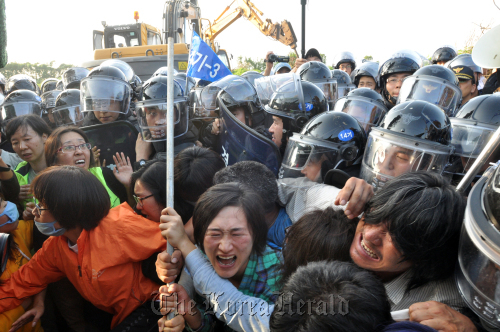Assembly Voice looks into critical issues and controversial bills through a series of interviews with rival lawmakers who lead the debate at the National Assembly ― Ed.
The Supreme Court last month gave the green light to the Navy’s plan to construct a new base on Jeju Island. But the ruling is seen unlikely to end the long-standing dispute as opposition parties, civic activists and village residents remain defiant and gear themselves up to use the presidential election in December to bolster their campaign to scuttle the project.
The scenic island has been the stage of demonstrations since the southern coastal village of Gangjeong was chosen in 2007 as the location for the base. Most recently, hundreds of protesters clashed with police in March as they attempted to block the demolition of rocky outcroppings on the site.
The Defense Ministry has underscored a need to build the naval base to bolster Korea’s weak maritime security against growing oceanic powers, and to strengthen strategic defense against military threats.
Leftist politicians, environmental groups and some local residents have claimed the base was unnecessarily provoking neighboring countries, the procedure was faulty and that it endangered the environment.
The Supreme Court last month gave the green light to the Navy’s plan to construct a new base on Jeju Island. But the ruling is seen unlikely to end the long-standing dispute as opposition parties, civic activists and village residents remain defiant and gear themselves up to use the presidential election in December to bolster their campaign to scuttle the project.
The scenic island has been the stage of demonstrations since the southern coastal village of Gangjeong was chosen in 2007 as the location for the base. Most recently, hundreds of protesters clashed with police in March as they attempted to block the demolition of rocky outcroppings on the site.
The Defense Ministry has underscored a need to build the naval base to bolster Korea’s weak maritime security against growing oceanic powers, and to strengthen strategic defense against military threats.
Leftist politicians, environmental groups and some local residents have claimed the base was unnecessarily provoking neighboring countries, the procedure was faulty and that it endangered the environment.

The deadlocked debate fast became a handy tool for politicking, while resulting in several lawsuits. The residents filed a suit to demand suspension of the construction, while the Navy submitted one against a greenhorn left-wing politician for calling the base a “pirate base.”
The conflict, which may have well been a simple “not-in-my-backyard” controversy in many other countries, ultimately became a national debate about the country’s security philosophy. As the country faced threats from North Korea while being at the center of rising power rivalry among the world giants in the region, voices calling for improved military power surged ― but so did staunch views against “provocative armament.”
The naval base, or the military-civilian tourism port as the government calls it, naturally became one of the popular agenda for the April general elections earlier this year, with the opposition alliance condemning the ruling camp for pushing ahead the “controversial and environmentally hazardous” plan. The ruling party shot back by pointing out that the base was promoted by progressive former President Roh Moo-hyun with then-avid support of many current DUP leaders.
The Saenuri Party was considered the winner in round one, by winning a majority in the parliamentary race. The DUP, however, had good reason not to let go of the issue as it won in all three Jeju constituencies.
Now, as the rivaling parties face the second round ― the December presidential race ― the Jeju predicament is likely to rear its head again. The DUP members are moving to form a parliamentary special committee for an all-out reconsideration of the plan. The Saenuri Party is confident that the ongoing construction will proceed as planned after the Supreme Court’s ruling in July that the Defense Ministry implemented the project lawfully.
Citizens fear that the issue could become ever more political, overshadowing the real question of national security, observers said.
The Korea Herald spoke to lawmakers of the Saenuri Party and the DUP on the National Defense Committee as they are set to collide head-on over the Jeju naval base in future sessions.
By Lee Joo-hee (jhl@heraldcorp.com)
-
Articles by Korea Herald










![[Hello India] Hyundai Motor vows to boost 'clean mobility' in India](http://res.heraldm.com/phpwas/restmb_idxmake.php?idx=644&simg=/content/image/2024/04/25/20240425050672_0.jpg&u=)









